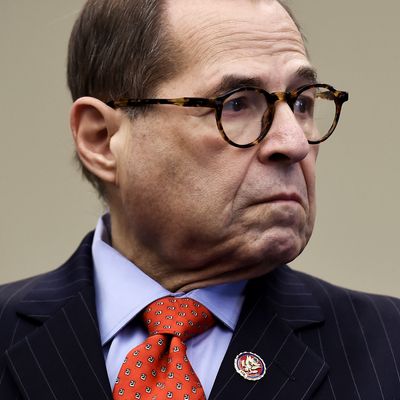
The House Intelligence Committee’s private and public examination of witnesses in connection with the president’s conduct toward Ukrainian officials has been labeled from the beginning an “impeachment inquiry,” at least since Speaker Nancy Pelosi announced the formal launch of that process on September 24. But now the spotlight shifts back to the Judiciary Committee, which, under the resolution adopted by the House last month, will be responsible for developing and reporting articles of impeachment, if any are brought, to the full House.
Following the second week of public testimony in front of the Intelligence Committee, Judiciary chairman Jerrold Nadler has announced the beginning of this last phase of the House’s segment of the impeachment-and-removal saga, as CNN reports:
The committee announced that it would hold a hearing December 4 on the “constitutional grounds for presidential impeachment,” with a panel of expert witnesses testifying.
House Judiciary Chairman Jerry Nadler sent a letter to Trump on Tuesday notifying him of the hearing and inviting the President or his counsel to participate, including asking questions of the witnesses …
In the letter, Nadler said the hearing would “serve as an opportunity to discuss the historical and constitutional basis of impeachment, as well as the Framers’ intent and understanding of terms like ‘high crimes and misdemeanors.’”
It’s smart of Nadler to begin by dealing with the disinformation Trump and his Republican allies have been spreading to buttress their claim that the impeachment inquiry is “unconstitutional” or otherwise illegitimate. It’s understandable that many people hearing about the Constitution’s “high crimes and misdemeanors” standard for impeachment think that it is a process that requires proof beyond a reasonable doubt of violations of criminal statutes. That isn’t the case at all (“crimes” and “misdemeanors” meant serious and disruptive misconduct to the Founders, or efforts to avoid legal accountability), but it may take some public education to get beyond this misconception.
The throat-clearing phase will also give other committees with investigative results that might be relevant to articles of impeachment time to weigh in with Judiciary. That’s most obviously the case with the Intelligence Committee, which is planning to send its report on the Ukraine scandal to Nadler & Co. next week.
Given the generally obstructive nature of the administration’s response to the impeachment inquiry, the odds of anyone officially representing Trump, much less POTUS himself, showing up at Nadler’s hearing is extremely low. But Judiciary Committee Republicans — led by ranking member Doug Collins, who has enlisted Trump’s help in trying to wrangle a Senate appointment back home in Georgia — will put on their MAGA hats (only figuratively, we can hope) and fight.
The big decision for Nadler and Pelosi is the range of articles of impeachment they choose to put forward. They could simply focus on Ukraine, or could include the massive evidence of obstruction of justice contained in the Mueller Report, or could encompass the systemic obstruction of Congress that the White House has engaged in since this president took office. But they don’t have a lot of time if they want to fulfill the Speaker’s plans to give impeachment to America as a Christmas gift.






























